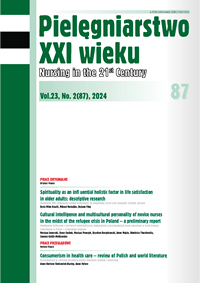Poglądy i doświadczenia pielęgniarek w czasie pandemii COVID-19
DOI:
https://doi.org/10.2478/pielxxiw-2024-0019Słowa kluczowe:
SARS-CoV-2, pielęgniarki rodzinne, personel pielęgniarski szpitali, status społecznyAbstrakt
POGLĄDY I DOŚWIADCZENIA PIELĘGNIAREK W CZASIE PANDEMII COVID-19
Cel pracy. Podstawowym celem było zebranie opinii i doświadczeń pielęgniarek nabytych podczas pandemii COVID-19, zidentyfikowanie znaczących problemów, które należy rozwiązać przed kolejną pandemią oraz określenie prestiżu zawodu pielęgniarki przed i w trakcie pandemii COVID-19.
Materiał i metody. Badanie miało charakter opisowy i przekrojowy. Reprezentatywną próbę dobrano z wykorzystaniem socjologicznych metod badawczych i przy użyciu niestandaryzowanego kwestionariusza. Próba badawcza pielęgniarek została skonstruowana przy użyciu kwotowego doboru próby; jej struktura odpowiadała składowi całej populacji pielęgniarek pod względem wieku, płci i regionu. Próba badawcza składała się z 1197 pielęgniarek.
Wyniki. Najistotniejsze zmiany zgłaszane przez pielęgniarki w tym okresie obejmują zwiększone obciążenie pracą fi zyczną (89,6%) oraz zmiany w życiu społecznym (88,4%) i osobistym (76,7%). Według respondentów prestiż ich zawodu wzrósł podczas pandemii w porównaniu z okresem przed pandemią COVID-19. Na podstawie dwustronnego testu t ustalono, że prestiż zawodu pielęgniarki wzrósł istotnie statystycznie podczas pandemii COVID-19 w porównaniu z okresem sprzed pandemii.
Wnioski. Podczas pandemii COVID-19 pielęgniarki doświadczyły zwiększonego stresu fi zycznego oraz zmian w życiu społecznym i osobistym. Jednak prestiż zawodu pielęgniarki wzrósł ze względu na ich kluczową rolę w walce z pandemią.
Bibliografia
1. Velký sociologický slovník, 1. vyd. Praha: Univ. Karlova Karolinum; 1996.
2. Calıskan NO, Yalın H, Eti Aslan F. Pandemic journey to prestige at nursing. Clin. Ethics. 2022; 17(4): 363-367.
3. Grinberg K, Sela Y. Perception of the image of the nursing profession and its relationship with quality of care. BMC Nurs. 2022; 21(57). https://doi.org/10.1186/ s12912-022-00830-4
4. Radosz Z, Gniadek A, Kulik H, et.al. Social reception of nursing in selected countries of the European Union. Problemy Pielęgniarstwa. 2021; 29(1): 14-21.
5. Freidson E. The profession of Medicine: A study of the Applied Sociology of Knowledge –With a New Afterword. Chicago, IL: University of Chicago Press; 1988.
6. Magnaye B, Muñoz SL, Muñoz MA, et al. The role, preparedness, and management of nurses during disasters. Int. Sci. Res. J. 2011; 3(4): 269-294.
7. Liu Q, Luo D, Haase JE, et al. The experiences of health-care providers during the COVID-19 crisis in China: a qualitative study. Lancet Glob Health. 2020; 8(6): 790-800.
8. Sharma R, Vishwas AS, Jelly P. Impact of COVID-19: nursing perspective and concern. International Journal of Community Medicine and Public Health. 2020; 7(11): 4648-4652.
9. Boudreau HS, Singh N, Boyd CJ. Understanding the Impact of Social Media Information and Misinformation Producers on Health Information Seeking. Comment on „Health Information Seeking Behaviors on Social Media During the COVID-19 Pandemic Among American Social Networking Site Users: Survey Study“. J. Med. Internet Res; 2022.
10. Garett R, Young SD. Online misinformation and vaccine hesitancy. Translational behavioral medicine. 2021; 11(12): 2194-2199.
11. Shivairová O, Bártlová S, Hellerová V, et al. Nurses’ mental health during covid-19 pandemic. Cent. Eur. J. Nurs. Midw. 2023; 14(1):795-804.
12. Halberg, N, Jensen PS, Larsen TS. We are not heroes- heroes-The flipside of the hero narrative amidst the COVID-19 pandemic: A Danish hospital ethnography. Journal of advanced nursing. 2021; 77(5): 2429-2436.
13. McMullan C, Brown GD, O’Sullivan D. Preparing to respond: Irish nurses’ perceptions of preparedness for an influenza pandemic. Int. Emerg. Nurs. 2016; 26: 3‐7.
14. Balicer RD, Barnett DJ, Thompson CB, et al. Characterizing hospital workers’ willingness to report to duty in an influenza pandemic through threat- and efficacy-based assessment. BMC Public Health. 2010; 10: 436.
15. Yonge O, Rosychuk RJ, Bailey TM, et al. The willingness of university nursing students to volunteer during a pandemic. Public Health Nurs. 2010; 27(2):174‐180.
16. Bártlová S, Tóthová V. Prestige of the nursing profession in the Czech Republic. J. Health Sci. Manag. Public Health. 2006; 7(1): 94-99.
17. Al-Hunaishi W, Hoe VC, Chinna K. Factors associated with healthcare workers’ willingness to participate in disasters: a cross-sectional study in Sana’a, Yemen. BMJ open. 2019; 9 (10): e030547.
18. Šupíková M, Jankovičová J, Jarabicová O, et al. Factors affecting nurses’ mental health during the COVID-19 pandemic. Kontakt. 2022; 24(3):205-201.
Pobrania
Opublikowane
Numer
Dział
Licencja
Prawa autorskie (c) 2024 Autorzy

Utwór dostępny jest na licencji Creative Commons Uznanie autorstwa 4.0 Międzynarodowe.




